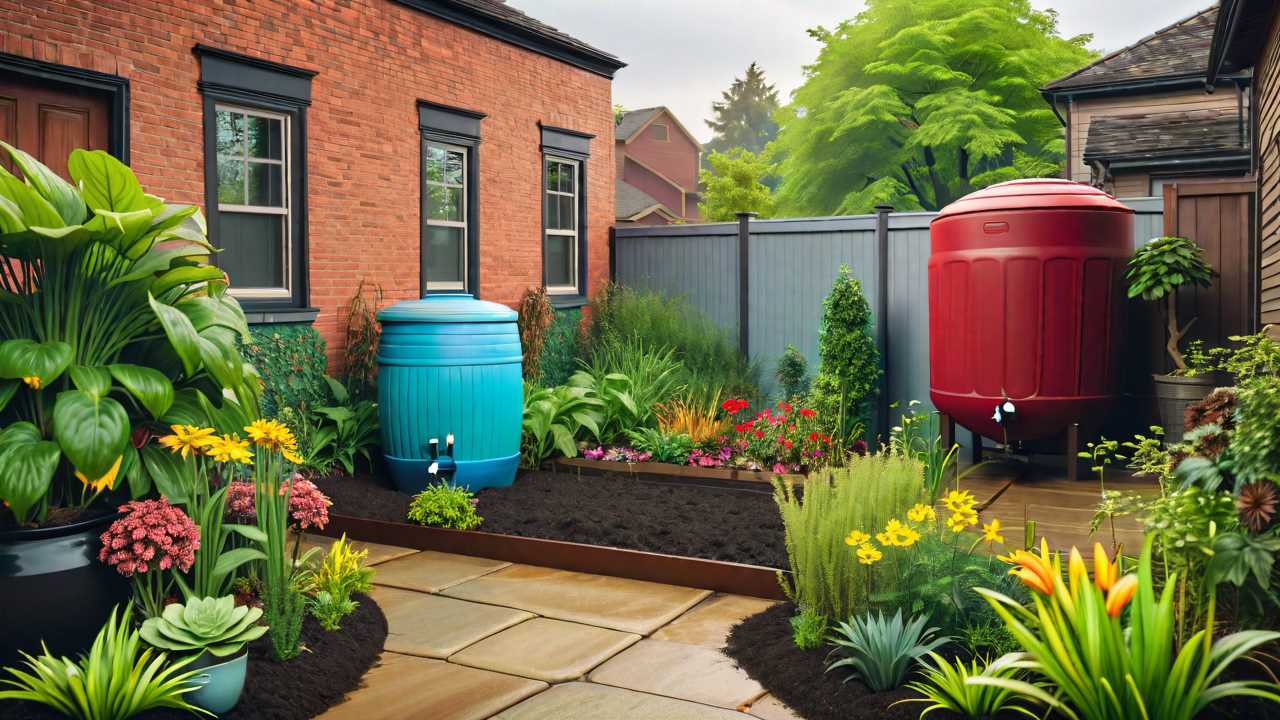
When it pertains to urban gardening, implementing efficient water conservation practices is essential for sustainability. By incorporating strategies like drip irrigation, selecting drought-resistant plants, and utilizing mulching techniques, you can significantly reduce water consumption in your garden. But these are just the basics. To truly optimize water conservation in urban gardening, there are a few more advanced techniques and tools that can take your efforts to the next level. Stay tuned to discover how you can further improve your water-saving practices and make a positive impact on the environment through your urban garden.
Efficient Irrigation Techniques
To maximize water conservation in urban gardening, employing efficient irrigation techniques is essential for optimizing resource usage and plant health. Drip irrigation systems, for example, deliver water directly to the plant roots, minimizing evaporation and runoff. Studies have shown that drip irrigation can reduce water usage by up to 50% compared to conventional methods.
Timing is important in irrigation; watering plants early in the morning can help minimize evaporation loss during the heat of the day. Monitoring soil moisture levels using sensors can also guarantee that plants receive just the right amount of water they need, preventing both over and under-watering.
Mulching around plants can further help retain soil moisture, reducing the frequency of irrigation needed. By implementing these efficient irrigation techniques based on scientific research and data, urban gardeners can significantly cut down on water wastage while promoting the health and growth of their plants.
Drought-Resistant Plant Selection
Selecting drought-resistant plants based on their water requirements and adaptability to arid conditions is essential for promoting water conservation in urban gardening. When choosing plants for your garden, opt for species that have evolved mechanisms to thrive in low-water environments.
Succulents such as cacti and agaves are excellent choices due to their ability to store water in their leaves and stems. Plants with deep root systems like lavender and rosemary can access water deep in the soil, reducing the need for frequent watering. Additionally, native plants are well-suited to local climates and often require minimal irrigation once established.
Consider the plant's growth habits as well. Groundcovers like creeping thyme or sedum can reduce evaporation from the soil surface and provide shade, further conserving water. Grasses such as buffalo grass or blue grama are drought-tolerant options that require less water compared to traditional turf grasses.
Mulching for Moisture Retention
What role does mulching play in urban gardening for improving moisture retention efficiency?
Mulching is a fundamental practice in urban gardening that significantly contributes to water conservation efforts. By applying a layer of mulch around plants, you can reduce evaporation from the soil surface, maintain soil moisture levels, and minimize the need for frequent watering. Research indicates that mulching can decrease water evaporation by up to 70%, creating a more sustainable and efficient water management system in urban gardens.
The use of organic mulches, such as straw, leaves, or bark, not only helps retain moisture but also improves soil structure, promotes beneficial soil organisms, and regulates soil temperature. These factors collectively boost plant growth and reduce water stress during hot and dry periods. Additionally, inorganic mulches like gravel or pebbles can provide effective moisture retention benefits in areas where organic materials may decompose rapidly.
Smart Watering Schedules
How can urban gardeners optimize their watering schedules for maximum water efficiency and plant health? Smart watering schedules are key to conserving water while ensuring your plants receive the right amount of hydration. To achieve this, consider factors such as plant type, weather conditions, and soil moisture levels.
Start by monitoring the moisture levels in your soil. Invest in a soil moisture sensor to accurately determine when your plants need watering. These sensors provide real-time data, taking the guesswork out of the equation. Additionally, water your plants in the early morning or late evening to reduce evaporation losses.
Adjust your watering frequency based on the specific needs of your plants. Different plant species have varying water requirements, so tailor your schedule accordingly. During hot summer months, plants may need more frequent watering compared to cooler seasons.
Frequently Asked Questions
Can Rainwater Harvesting Be Beneficial for Urban Gardening?
Rainwater harvesting in urban gardening is highly beneficial. It reduces reliance on municipal water, conserves resources, and can improve plant health due to its purity. Implementing this practice can lead to sustainable and efficient water use.
Are There Any Water-Saving Gadgets for Small Gardens?
In small gardens, water-saving gadgets like drip irrigation systems or moisture sensors can reduce water usage by up to 50%. These tools provide efficient water distribution, ensuring plants receive just the right amount of water they need.
How Can Greywater Be Safely Utilized in Urban Gardening?
Utilizing greywater in urban gardening involves treating and redirecting household water for irrigation. Through filtration systems, you can safely harness this resource, reducing waste and promoting sustainable gardening practices in your urban setup.
What Are the Benefits of Using Self-Watering Containers?
You might think self-watering containers are costly, but the benefits are worth it. These containers conserve water by reducing evaporation, ensuring plants receive just the right amount of moisture, promoting healthier growth.
Is It Possible to Create a Water-Efficient Vertical Garden?
You can definitely create a water-efficient vertical garden. By utilizing drip irrigation systems, selecting drought-resistant plants, and incorporating moisture-retaining soil amendments, you can optimize water usage and promote sustainability in your urban gardening endeavors.
 SportsHollywoodLifestyleFashionHome & GardenTrendsPrivacy PolicyTerms And Conditions
SportsHollywoodLifestyleFashionHome & GardenTrendsPrivacy PolicyTerms And Conditions
